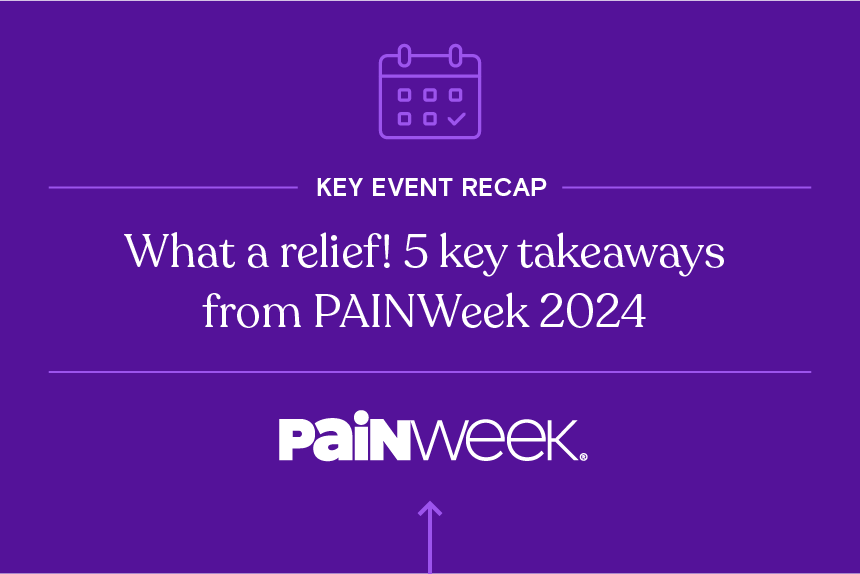No, it’s not a nickname for a grueling training camp. Heck, it’s not even a full week.
In actuality, the injurious-sounding PAINWeek is the largest gathering of pain management professionals in the country.
This year, PAINWeek returned to Las Vegas and brought together thousands of healthcare professionals for an immersive exploration of pain management innovations. Attendees had their pick of over 75 courses and sessions detailing emerging trends and technologies, best practices, and interdisciplinary strategies to improve patient outcomes.
Definitive Healthcare was one of nearly 70 vendors in attendance, and I got to tag along. Between the big ideas shared across sessions and the exciting new tech demonstrated in the exhibition hall, I found myself thinking about a handful of key themes after I left the conference. Keep reading to learn about the main takeaways from PAINWeek 2024.
1. Successful pain management is patient-led
One of the standout lessons from PAINWeek 2024 didn’t come from a medical expert or scientist, but rather from a patient: Pain management is about treating a whole person, not just their pain, and that means putting their perspective and voice first.
Wednesday’s keynote address was by Charles Clark, a former world-class sprinter whose career was cut short by injury. Clark shared his deeply personal journey from despair to hope, discussing how alternative therapies helped him regain control of his life. His session, titled “Through the Eyes of a Patient: Transforming Pain into a Thriving Life,” resonated with the audience, highlighting the essential role that patients’ perspectives play in shaping pain management strategies.
This emphasis on patient-centered care and platforming patient experiences was a recurring theme throughout the event, echoed in sessions like “Three Patients, Three Stories, One Challenging Disease: Examining Complex Regional Pain Syndrome Through the Patient’s Perspective” and “Real World Evidence on Psychedelics for Pain - Patient Perspectives”.
Another session, “Communication Matters!”, took this concept further, using study results to demonstrate how many patients feel dismissed and marginalized by their pain management providers. Focusing on communication skills can improve care outcomes and patient satisfaction, especially for patients with chronic pelvic pain and other chronic pain conditions.
2. Non-pharmacological treatments continue to complement traditional therapies
Another major theme at PAINWeek 2024 was the integration of non-pharmacological treatments (sometimes referred to as ‘alternative’ or ‘complementary’ medicine) with traditional medical therapies. All throughout the exhibition hall, vendors showcased innovative pain management tech like acoustic wave therapy, red light therapy, and virtual reality therapy, along with tried-and-true alternative modalities like cannabidiol (CBD), saunas, and ice baths.
Sessions on acupuncture, mindfulness, and psychedelic therapy informed attendees about alternative solutions that can help patients reduce reliance on opioids and other pain medications. The session “Poking Around: An Introduction and Integration of Acupuncture Into Your Practice” was a particular crowd favorite, illustrating how the ancient practice of acupuncture can support modern pain therapies.
I was especially interested in discussions on neuromodulation, the process of using electrical or chemical stimulation to alter nerve activity and potentially inhibit pain. As a noninvasive, nonaddictive pain management method, it offers particular value for people with recurring musculoskeletal pain, as well as those who live with fibromyalgia, anxiety, depression, or migraines (the last category hits home for me, personally). At least five sessions focused on this modality’s potential applications and ideal patient base.
3. The medical community is reevaluating the role of opioids
As expected, the opioid epidemic remained a critical topic at PAINWeek this year, with more than 20 sessions dedicated to opioid stewardship and addiction prevention. In these sessions, attendees explored the ins and outs of opioid use disorders and the impact they have on individuals and families, as well as the economy and society as a whole.
The session “Opioid Odyssey: Navigating the Stewardship Seas” provided healthcare professionals with actionable strategies to balance the need for effective pain relief while mitigating the risks of addiction and overdose. Others focused on best practices for prescribers, abuse-deterring formulations, and the role of telemedicine in opioid tapering.
These conversations reflected a broader push across the conference to reevaluate the role of opioids in pain management, encouraging clinicians to adopt a more holistic, multi-disciplinary approach that includes behavioral therapies, non-opioid medications, and patient education.
4. Behavioral health is a critical part of the pain management equation
Anyone who has dealt with chronic or recurring pain understands that it’s not only a physician sensation but also a psychological experience. The stress of anticipating the next flare-up or having to plan your day (or life) around pain can be mentally and emotionally taxing—and that’s on top of the bodily ache.
Thankfully, PAINWeek 2024 made a big point of addressing the mental health components of chronic pain. Sessions focused on managing pain in culturally diverse populations, addressing biases in pain perception, and using cognitive-behavioral strategies to help patients cope with chronic conditions all highlighted the holistic, multi-disciplinary reality of pain management and the importance of collaboration across specialties.
Other sessions more broadly tackled the need for interdisciplinary care teams in the pain management space. “Virtual Comprehensive Pain Care: Outcomes from an Interdisciplinary Approach in 71 Patients” presented promising results from a study in which one such care team collaborated virtually to address patients’ physical, emotional, and psychological experiences related to complex chronic pain.
5. AI tools are helping treat pain, too
It’s getting harder and harder to find a field of medicine where artificial intelligence (AI) isn’t making waves. AI technology took center stage at PAINWeek 2024, with special attention paid to its ability to personalize pain management to patients’ individual needs.
Speakers and vendors also had plenty to say about the potential of AI for diagnosis, treatment planning, and care outcome prediction. One session suggested that AI can help doctors overcome well-documented biases in pain management related to race, gender, and class and ultimately make care more equitable.
For the many pain management doctors in attendance, especially those who are feeling the pain of long hours and understaffed care teams, AI presents a potential salve to impending burnout: Not only can AI improve care outcomes for patients, it also offers streamlined clinical workflows, automating routine and time-consuming tasks related to charting, note-taking, test result and imaging analysis, and more.
Of course, AI isn’t without its risks. One session I attended, “AI in Pain Management: Promising or Problematic,” noted that only 15% of Americans are more excited than concerned about the use of AI in daily life. Ethical concerns related to data accuracy, privacy, and lack of transparency will continue to be a part of the AI conversation as this technology grows and changes over the years to come.
See what’s coming next in pain care
Pain management is a rapidly transforming field involving multiple specialties, facility types, therapies, and technologies. We can’t tell you what discussions will be on the docket at PAINWeek 2025, but our healthcare commercial intelligence can help you understand your particular corner of the market and prepare for whatever comes next.
Sign up for a free trial of the Definitive Healthcare platform, and get access to powerful data, analytics, and visualization tools that deliver real-time insights into the patients, providers, and treatments that your business needs to know to succeed.





